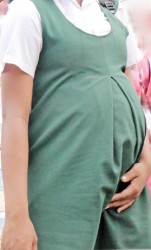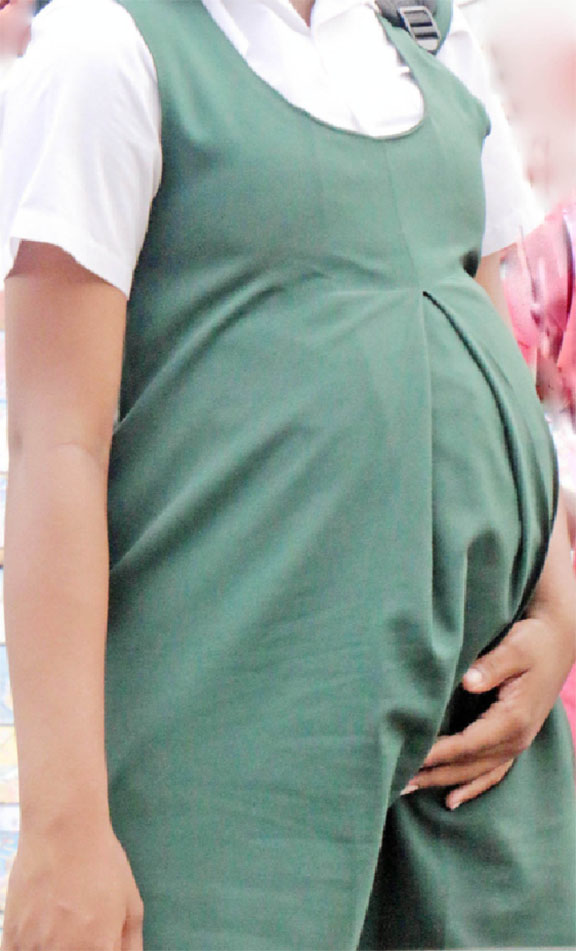She would not say why and preferred to bend her head shyly when pressed, but at the tender age of 14, for some reason, Jane (not her real name), decided to leave her parents’ home and start a common-law relationship with a man.
The fact that her father told her “you can’t come back on a ship when you jump off” might shed some light into the child’s home environment. But it becomes chilling when just a few months later, pregnant and battered by her then 19-year-old partner, she turned to her mother who instead of reporting the assault, encouraged her to return to the man.
“I don’t know why she do it. Must be because I been pregnant already, but I know if I go back more licks I woulda get,” the child told the Sunday Stabroek in a recent interview.

“I come and I tell me case worker to put me in a home because I didn’t want the licks no more.”
Today her son is five months old and she struggles with waking up in the night and nursing him and taking catering classes at the Sophia Training Centre. But she is determined to one day become independent and take care of her son.
“I didn’t want to give him away. I would study hard and then try to get a job and a land and ask Food for the Poor to help me build a house,” the young mother said positively.
Jane is one of 58 underage girls who gave birth at the Georgetown Public Hospital (GPH) last year; the numbers putting the spotlight on how rampant the sexual abuse of young girls is, even with the implementation of the Sexual Offences Act.
Critics have repeatedly said that while the act looks good on paper it does little to help those it is supposed to protect.
The GPH had recently disclosed that some 1,332 teenagers between the ages of 14 and 18 gave birth at the institution. A further query by this newspaper revealed that 58 were under the age of 16; the legal age when a person can consent to sexual intercourse in Guyana.
According to information provided by the CC&PA through the Ministry of Human Services & Social Security all 58 cases were referred to the agency and after an assessment the girls were placed at the Mahaica Children’s home which caters exclusively for girls and has provision for accommodation of victims of underage pregnancies and their babies.
At present, there are 10 such victims in the home awaiting delivery and one has already requested that her baby be adopted. Six others have decided to keep theirs.
Unfortunately, according to the ministry, only three of these cases have reached the court system with the remainder still being investigated, even though a number of the perpetrators have not been identified.
Can’t be found
For Jane it is not a case of the man not being identified but he apparently cannot be found. However, he found out that she had given birth at the GPH and had turned up.
“I was in de bathroom and when I come out he deh over de baby and I tell he move from de baby and he tell me how he come fuh he son,” the child said.
She said she raised an alarm, but before the nurses could have gone to her assistance the man revealed that he had a knife. The police at the hospital outpost were called in and the man was arrested.
“But he brother come and say how he is a psychiatric patient and how he have to get he medication and dem loose he. Is like de police at de hospital didn’t know he been wanted fuh raping me and by de time dem know dem can’t find he,” she said.
Jane has not heard from the man since and she hopes she never sees him again.
“He can’t have claim to me baby because he say how is nah he baby. Two times he done say so…,” Jane said even though she is still not clear about whether she wants him behind bars.
She also revealed that she has only seen her mother once since she has been in state care.
“I don’t hate me mother nor me father, but I know I can’t go back and live with dem. Is me and me baby now,” the child said.
‘Employable skills’
According to Director of the CC&PA Ann Greene young mothers like Jane are placed in state care while being equipped with “employable skills” to help them to find jobs when they become adults and for her being employed means that they would have options.
“They want their babies… We don’t just take babies they have to decide… But when they finish their courses they can apply for jobs and they can rent a place, put their babies in daycare and manage their lives,” Greene said.
For her it is about giving them the skills so they could become independent. Jane stressed how important it was to her to be able to support her child after leaving the home.
It is a tall order considering that she is still a child herself, but Greene believes that with the right counselling, independence will go a long way.
“What we try to do is empower them, build their self-esteem so that they could make some informed choices,” she said.
Once in state care the teenagers and their babies are provided for and they are given a second chance.
Greene said that once a case of underage pregnancy is reported to the agency officials then would have to report it to the police as it mandated under the law. An investigation is then launched. She noted that the GPH follows a policy of alerting the agency the minute an underage pregnancy is presented there. The hospital also does not allow the mothers to leave until they are given the green light by the agency.
Many times the investigation is stalled because the teenagers would not say who the perpetrator is.
“A lot of the time we would get ‘it is a boy name Shawn’ or something like that and he gone in the bush so we can’t find him,” Greene said.
There are times when relatives offer to take the teenager and the baby and they are allowed if they can offer the support needed and it is ascertained that they are not in collusion with the perpetrator.
“We wouldn’t take them if there is good support from their relatives, all that assessment has to be made because whenever a child comes into care it is a last resort. It can’t be as a first resort because we would run out of space… When you come to us it is because there is no alternative,” Greene told this newspaper.
Predators on the prowl
While attempts are being made to fight sexual violence against children, Greene said the culture of the nation still accepts sexual assault of children and it is difficult to get some to understand that it is a crime to have sex with a child.
“We have to bridge that gap between culture and law, it is quite challenging sometimes… and then we cannot rule out poverty [as] a contributing factor,” she said.
There are adult men who are going after schoolgirls and initially pretend that they are assisting them to go to school but in the end demand sexual favours.
“If you want to have sex with an underage girl, a school girl, it is perversion… The adult men are taking advantage of these girls,” she stressed adding that the children find themselves in difficult circumstances and feel there is no way out.
“It is really despicable to see what is happening to these young girls, they are being deflowered, getting a child in childhood… Childhood should be a carefree time, for your development and they are being robbed of this,” Greene lamented.
When speaking to men Greene said she would stress that they respect a girl in a uniform and if she is going down the wrong path it is their responsibility to steer her correctly and not take advantage of her.
Many times teenagers are crying out for love and attention as their home situations are dysfunctional and it is then that paedophiles prey on them.
Policy of reintegration
Meanwhile, the Ministry of Education said it is looking at the option of implementing an official policy to reintegrate pregnant teenagers into the school system
“Right now we don’t have an official policy of either locking them out or reintegrating them,” Minister of Education Priya Manickchand told this newspaper. “We want a policy that serves the need of persons who might have made a mistake or even if they did not make a mistake it is not healthy for the country to have children who did not finish high school.”
She explained that at present what happens is a “little bit ad-hoc” as while some children have been allowed to finish their schooling there are those who might have discontinued, “because the system wasn’t smooth and persons weren’t clear about what could happen they essentially dropped out.”





